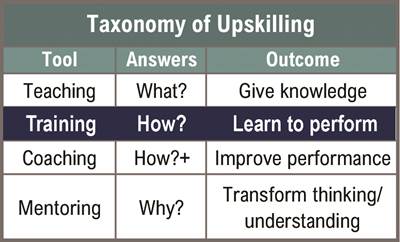Growth Strategies for Success
Some manufacturing companies continue to grow, year after year, regardless of economic conditions. Here are their strategies you can implement to have the same results.

Ever wonder why some machining companies keep growing regardless of the economy? They land new business, hire more people and upgrade their technology. To understand how they do this, think about the process used to machine a new part out in the shop.
As a machining professional, you would never attempt to machine a precision component without a plan and proven process. Guesswork and flying by the seat of your pants would never cross your mind. Yet, that’s exactly how many small to mid-sized machining companies approach business development—no plan, no process. The result is their companies end up “bobbing in the water.” That’s when a company’s sales are up a little one year, down the next, back and forth, year after year. Five years later, sales are about the same as they were five years earlier. It happens too often in the machining business, but it doesn’t have to be that way. With a plan, a process and lots of hard work, you, too, can have a business development program that delivers a steady stream of new revenue year after year.
Here are some strategies to jump start your business development program. Start by looking at what machining companies with highly successful new business programs are doing to land new business. These companies have nine things in common that you can also do to generate new business:
- Take a hard look in the mirror. Conduct a formal business development audit that can help you better understand what you are doing well and where you can use some help.
- Differentiate your company from the competition on something other than price. Unless you can show a customer how you are different, and better, than the competition, they will default to the only standard of comparison you’ve given them—price.
- Scrutinize every detail of how you present yourself to customers and prospects. Make your website the hub of your marketing effort and craft effective selling tools such as a capabilities presentation, case histories, white papers, emails, and so on. Also, carefully orchestrate every detail of what you do when customers or prospects visit your plant. Don’t leave anything to chance.
- Increase the size of the average job in your pipeline by landing bigger projects. Most small to mid-sized machining companies have way too many small jobs. While these keep the lights on and the machines running, they rarely produce the kind of revenue it takes to hire and retain the best people and upgrade technology. Bigger projects generate the capital it takes to truly grow your business.
- Methodically open the right new doors, and then keep them open with a nurturing program that keeps your name in front of customers and prospects until they are ready to buy. At any point in time, only 5% of your customers are in the buy mode. Nurturing that other 95% is what brings stability and sustainability to your new business program.
- Get more feet on the street. Consider adding a proven business development specialist to your staff or developing a formal independent rep program to extend your reach in the market. Rep programs can be very effective if you give your reps effective selling tools and manage them the same way you would manage an internal sales team.
- Leverage your current work and relationships into new opportunities with prospects who have needs like those of your current customers. Don’t forget to ask your best customers for referrals to their counterparts in their sister companies/divisions. This is often the low hanging fruit.
- Open new markets and make sure no one customer or industry represents more than 25% to 30% of your business. There’s safety in diversity.
- Protect your core business. One of the most common mistakes companies make when they begin to diversify is taking their eye off the ball in their core business. Put just as much effort into expanding your book of business with your existing customers as you do with cultivating new relationships.
Want to see how your program stacks up with other machining companies? Take that hard look in the mirror. To make it easier, I’ll send you a free copy of a business development audit specifically designed for machining companies. You can conduct the audit yourself or hire a business development expert from outside your company to assist you. Either way, the audit will provide you with a roadmap for developing an effective and sustainable business development program that will enable you to grow your company and stop “bobbing in the water.”
About the Author
John R. Wirtz
John R. Wirtz is president of Pinpointe Marketing LLC. He works exclusively with the owners and senior management teams of small to mid-sized machining companies to help them grow their businesses. Contact Mr. Wirtz at 440-506-8963 to request your free copy of the Business Development Audit.
Read Next
Workforce Development—Training Shows How
To expand on his “Workforce Development—What We Can Do Better” article, Miles Free explains the Who, What, Where, When, Why, How and How Many of one of the four upskilling tools—training.
Read MoreAre You Seeing 2020?
Without good vision, moving forward—in life, in business, or anywhere—can be difficult. Here are some ideas for creating a plan for the upcoming year.
Read MoreEmerging Leaders Nominations Now Open
Here’s your chance to highlight a young person in your manufacturing business who is on the path to be a future leader moving your company forward.
Read More








.jpg;maxWidth=300;quality=90)







